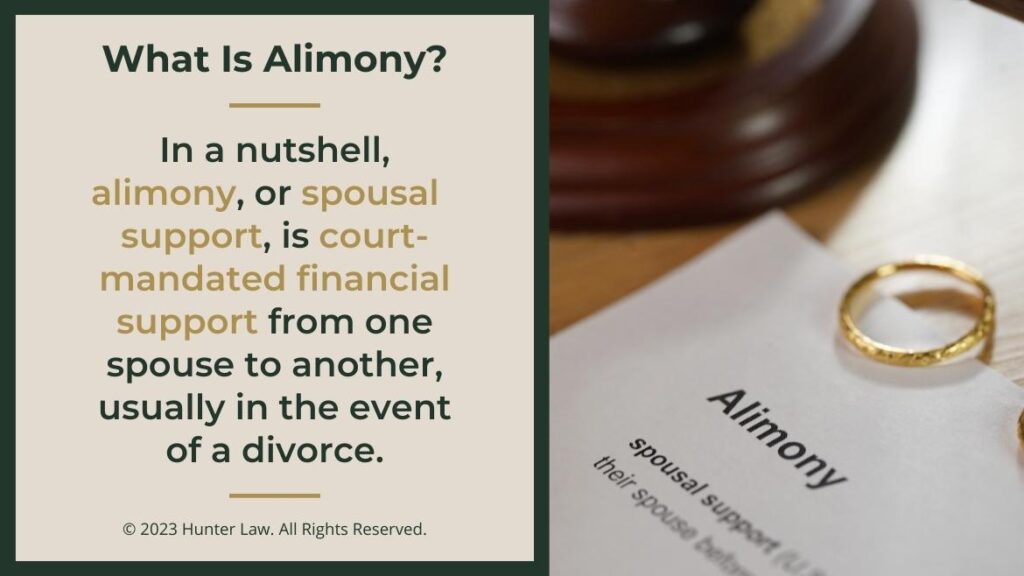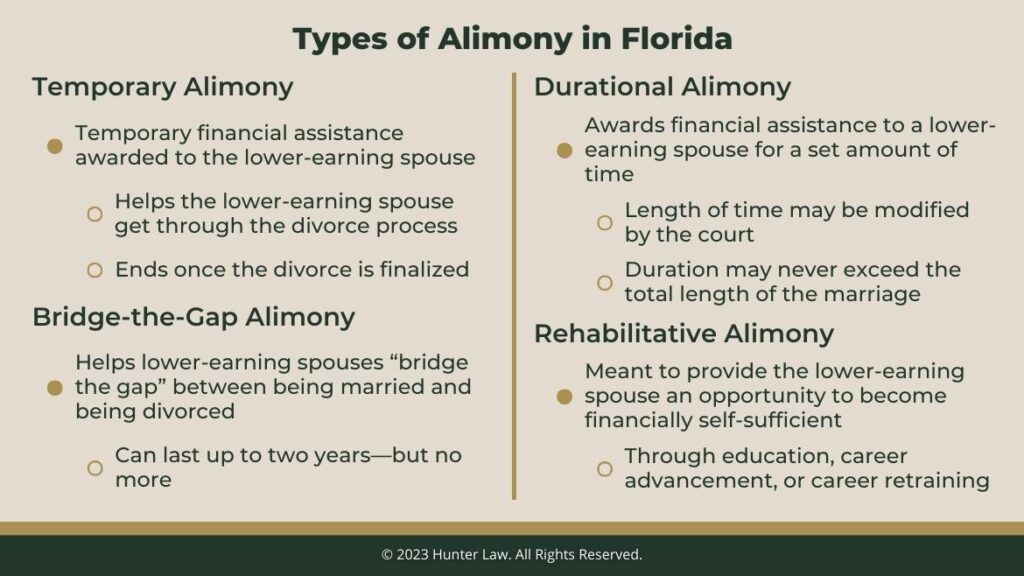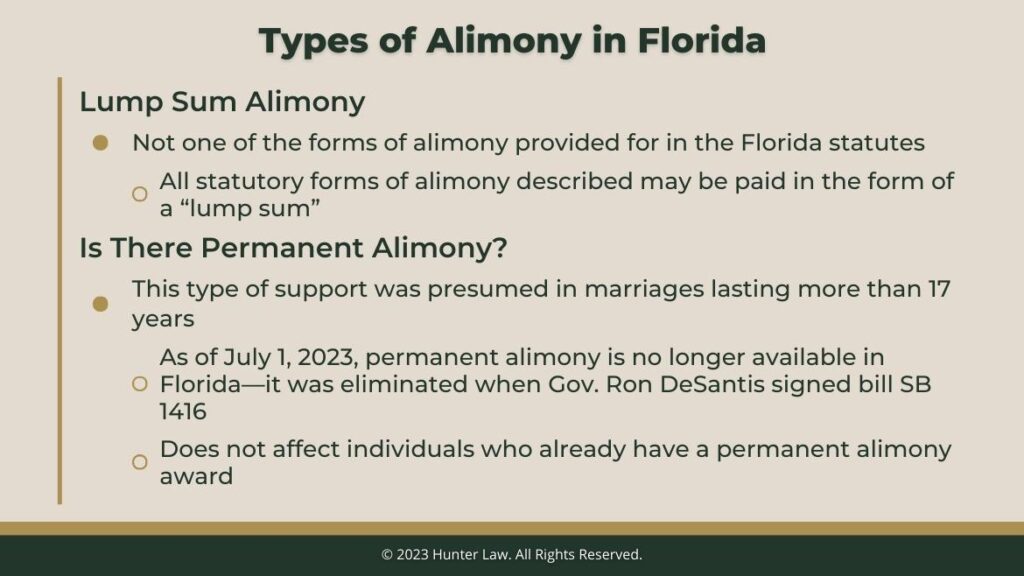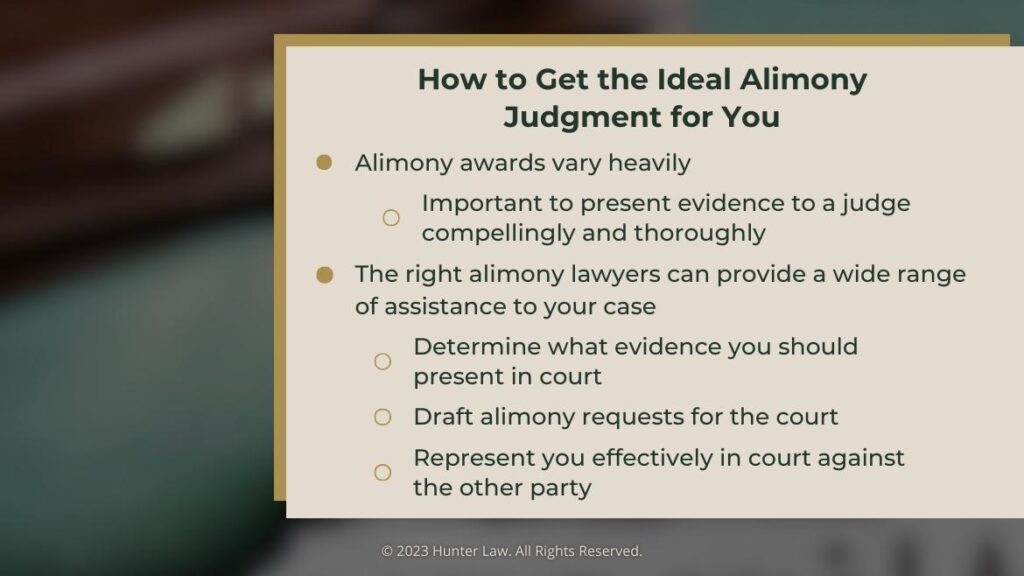Getting divorced is a difficult process by itself, even without considering a topic like alimony, also called “spousal support.” Whether you hope to receive alimony or know that you’ll have to pay it, it helps to understand your alimony options in a Florida divorce from the start. Let’s take a closer look.
What Is Alimony? ( Spousal Support)
Alimony, or spousal support, is, in a nutshell, court-mandated financial support from one spouse to another, usually in the event of a divorce (but it may be awarded without dissolution of marriage). For example, if two people split apart and one partner makes six figures while the other partner doesn’t work to be available to take care of the children, the court will likely order alimony from the higher-paid partner to the other.
The usual purpose of alimony is to ensure that the lesser earning partner is able to maintain a standard of living that is at least similar to the standard of living during the marriage after they get divorced. However, it can also be intended to provide for other things, such as time to get a job or funding to train for job options by attending a college program.
Preparing for Divorce in Tampa with Advice from the Best Divorce Lawyers

Types of Alimony in Florida (Spousal Support)
Florida laws allow for several types of alimony for supporting a former spouse. Here’s a breakdown of the different types of spousal support a court might mandate for your case.
Temporary Alimony
Temporary alimony is exactly what it sounds like: temporary financial assistance awarded to the lower-earning spouse to help them get through the divorce process. The lower-earning spouse needs to demonstrate financial need and show that the higher-earning spouse has the financial means to provide this kind of support. Essentially, temporary alimony helps “level the playing field” so the parties can face each other on a more even basis.
Temporary alimony ends once the divorce is finalized, and may be very short term as a result.
Bridge-the-Gap Alimony
Bridge-the-gap alimony is a less common form of support awarded by Florida courts and a few other states. It helps lower-earning spouses “bridge the gap” between being married and being divorced, helping maintain their quality of life through the transition.
Bridge-the-gap alimony can last up to two years but no more. Courts may award it to spouses who are, for instance, waiting for the sale of the marital home or to get a full-time job. After the awarded period of time expires, or if the lower-earning spouse remarries in that period, or if either party dies, the bridge-the-gap alimony terminates.
Durational Alimony
Durational alimony awards financial assistance to a lower-earning spouse for a set amount of time. The length of the award may be modified by the court, shortening it or lengthening it, but in no event may the duration exceed the total length of the marriage.
For example, a court might award a lower-earning spouse durational alimony for five years (sixty months), which in this example is when their children turn 18 years of age. In this example, the lower-earning spouse will receive monetary payments from the higher-earning spouse for sixty months, and then the durational alimony will terminate.

Rehabilitative Alimony
Rehabilitative alimony is another uncommon form of spousal support in Florida and the US. It’s meant to provide the lower-earning spouse an opportunity to become financially self-sufficient through education, career advancement, or career retraining.
For the court to order rehabilitative alimony, the party seeking financial assistance has to show:
- A rehabilitation plan, like plans to attend a college program
- A breakdown of the specific costs for their rehabilitation plan
- Explain the specific duration of the plan and how the plan will lead to the spouse becoming self-sufficient
The length of rehabilitative alimony cannot exceed five years. An award of rehabilitative alimony may be modified or terminated based upon a substantial change in circumstances, upon noncompliance with the rehabilitative plan, or upon completion of the rehabilitative plan if the plan is completed before the length of the award of rehabilitative alimony expires.
Lump Sum Alimony
Although itself not one of the forms of alimony provided for in the Florida statutes, all of the statutory forms of alimony described above may be paid in the form of a “lump sum” (usually one-time) payment. This may be more convenient for the payor, or it may benefit the payee. This is a very fact-specific issue and varies from case to case.
Is There Permanent Alimony in Florida?
Previously, the most common form of alimony in Florida was called “permanent periodic alimony.” This type of support was presumed in marriages lasting more than 17 years. Also, a court could award permanent alimony in marriages of less than 17 years if the court found there were special circumstances in that marriage that warranted such an award.
However, as of July 1, 2023, permanent alimony is no longer available in Florida. Gov. Ron DeSantis signed bill SB 1416, which eliminated permanent periodic alimony as a form of spousal support in Florida for any cases that were pending on or started after that date.

Note: this change in the law does not affect individuals who already have a permanent alimony award.
For all of these alimony types, it may be helpful to use an alimony calculator to determine what you’ll pay or receive.
How to Get the Ideal Alimony Judgment for You
Because alimony awards can vary heavily, it’s important that you present evidence to a judge compellingly and thoroughly to get the ideal alimony decision for your specific needs.
For example, if you are a higher-earning spouse, you might want to minimize the alimony your soon-to-be ex-spouse will receive. The reverse is true if you are the lower-earning spouse in the marriage.
In either case, contacting Florida divorce lawyers is your best choice. The right alimony lawyers can provide a wide range of assistance to your case, including:
- Helping you determine what evidence you should present in court
- Helping you draft alimony requests for the court
- Representing you effectively in court against the other party
- And more
Divorce is already stressful enough. You don’t need to take on an additional burden by doing all of this yourself when Florida alimony attorneys can help shoulder the burden for you.
Alimony & Child Support Lawyers: Securing Fair Support Agreements in Florida

Get in Touch with Florida Divorce Lawyers Today
Ultimately, your best chance at securing an optimal alimony decision from the divorce judge is to work with Hunter Law. Our knowledgeable, experienced Tampa divorce lawyers are well-equipped and ready to assist with your spousal support case in any way possible, and we know what it means to support you during this challenging time. Contact us today.


